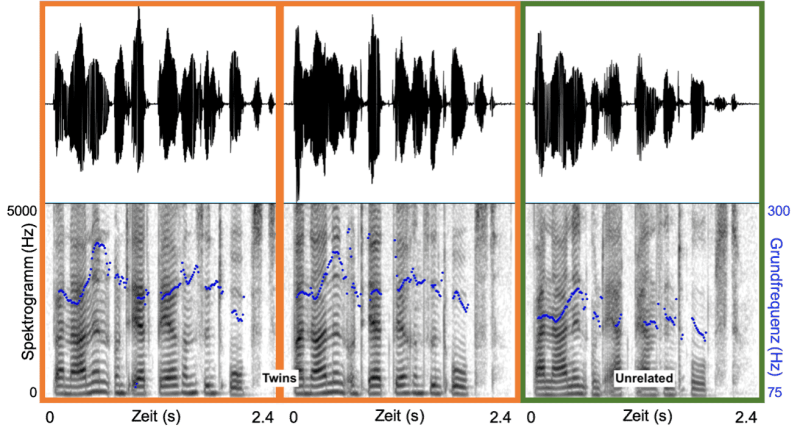
Funded by International Max Planck Research School for Science of Human History
Project Description
Kinship is one of the crucial elements of human interaction, along with other social information such as identity, emotion, age, gender and personality traits. Kinship recognition helps us understand others better, establish self-identity in the community, and develop cooperative attitudes. Although, there are number of studies on kinship recognition in faces, little is known in voices. We are currently working on two projects on this topic.
- Kinship recognition in unfamiliar voices
Do siblings sound similar? We investigate whether voices of female sibling pairs with different degrees of relatedness (monozygotic twins, dizygotic twins and non-twin siblings) are distinguishable from unrelated female individuals. - Perception of self-similarity in voices
How do we perceive speakers that sound similar to our self? We investigate how people perceive self-
similarity in voices as a potential cue of kinship, by using parameter-specific voice morphing. We morph the listener’s own voice and reference voices and examine how familiar, trustworthy and dominant the listener finds these generated voices.
We are looking into the behaviour of the participants as well as their brain signals (electroencephalogram: EEG). Also, we are interested to compare different listener groups (Autistic people – Neurotypical people, Musicians – Non-musicians, German native speakers – Chinese native speakers). Furthermore, we analyse the voice recordings to explore which components of the voice contribute to auditory kinship recognition.
Images of an Audio Wave
Collage: Ayaka TsuchiyaPublications
Tsuchiya, A., & Schweinberger, S.R., 2022. In-Mind Magazin. Themenausgabe: Wie verstehen wir andere besser? Teil 2 Heft 1/2022
-
Maria Zangemeister
University hospital Jena
Contact via: maria.zangemeister@uni-jena.de
-
Stefan R. Schweinberger
Department for General Psychology and Cognitive Neuroscience, FSU Jena, stefan.schweinberger@uni-jena.de

